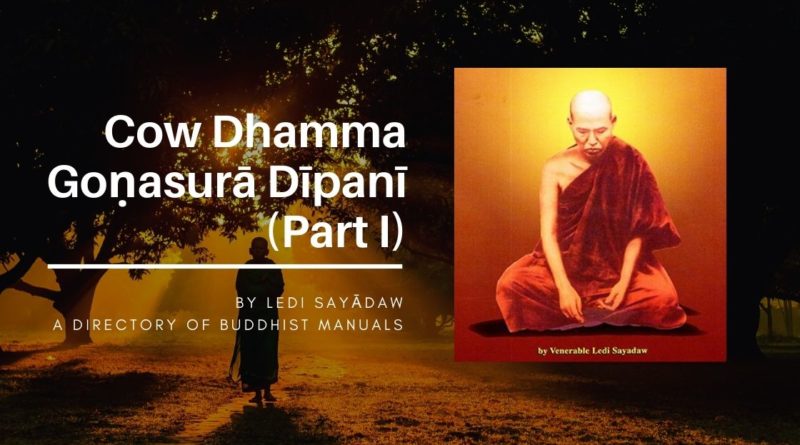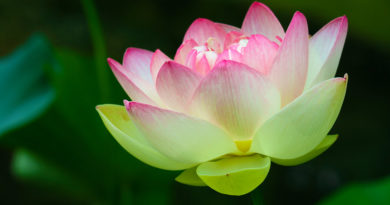Goṇasurā Dīpanī – An Appeal For Cows – Ledi Sayadaw
MAIN CONTENT
An Appeal For Cows
Venerable Ledi Sayādaw wrote this “Appeal for Cows” in 1886, on the request of the elders of Monywa.
This age witnesses brutality and inhumanity due to the maturing of past evil kamma. Catastrophes have arisen just like that suffered by the Buddha’s relatives who were murdered by Viṭaṭūbha in revenge. Both the guilty and innocent, old and young, suffered brutal death. The whole Sakyan nation disintegrated. The Buddha appealed three times to Prince Viṭaṭūbha to let them live in peace, but the past evil kamma of the Sakyans was too great to be offset even by the Buddha’s repeated intervention. They had done serious kamma in the past, which now had to ripen. The Dhammapada Commentary [to verse forty-seven] relates this story in detail. The moral is that not even God can forgive evil kamma. Only good kamma of the highest type purifies bad kamma.
As for the vengeful prince, he too suffered bad consequences as he was drowned in the river. He became food for fishes and turtles. His anger ruined him at last. Thus to revenge a wrong means both parties have to suffer for their evil deeds. The Buddha teaches that mankind experiences progress and prosperity when it acknowledges the factor of gratitude. Man must develop the four Brahmavihāras — the Divine Abidings — for prosperity and longevity. The Dhamma of gratitude is fundamental for the practice of love, compassion, sympathetic-joy, and equanimity.
Those who harm cows or eat their flesh suffer poverty and downfall. Due to their ingratitude, they face various dangers in the present. The future dangers to be incurred, are determined by their present deeds.
The four Brahmavihāras are the traditional protectors of the world. They imply loving regard for others, whether men or animals. The world’s situation is getting worse with famine, terrorism, wars, natural disasters, drug use, etc. Even in Buddhist countries, harsh treatment of cows, killings of cows, eating of beef, etc., can be seen. Non-Buddhist countries encourage the meat-trade, forsaking the precept of non-killing.
People should avoid occupations such as trading in arms, livestock, meat, poisons, and intoxicants. These moral principles, though well-known throughout the world, are seldom observed. People lack compassion, so they become evil. Their greed for wealth and power ever increases. So they resemble, even now, hungry ghosts (petas). Seeking only their selfish ends, they behave like animals. They are too proud. Although their livelihood depends on the services of animals, they kill, torture, and eat them. They even make sport of them. Cows are man’s best friends. Butchers and meat-traders go to hell, their ingratitude being so great.
Meat-eaters can incur the same guilt as butchers and meat-traders if they approve of killing. If one praises the prosperity of livestock farmers and meat-traders, one’s kamma is just like a butcher’s with the attendant evil results. Sometimes approvers and supporters can incur more blame than the perpetrators. It depends on the state of mind. The serious fault here is that one destroys justice and righteousness. One’s view is also wrong, which is the greatest error in the world. These facts are explained in the Vibhaṅga and its commentary.
Buyers depend on sellers, who in turn depend on buyers. Buyers help sellers by enjoying their produce. Especially in the matter of food, sellers have to depend on buyers. Money is used for further killing. So some animal species are endangered due to increased killing.
Man is Driven by Lust for Meat
Man enjoys meat eating as he likes without regard for the Dhamma. His greed compels him even to eat cows’ flesh, blind to the serious evil of ingratitude. In earning his livelihood he overlooks wrong-doing. For his immoral livelihood he gets serious effects in the lower worlds in future for the sake of benefit in the present life.
Some people maintain that meat improves the human body and brain. Meat is essential for our health, they say. However, the Pāḷi text says that health is dependent on balanced living, free from excesses. Whether meat is essential is not the point. Those who eat meat without restraint suffer from diseases. Such cases are mentioned in Sutta Piṭaka, Dhammapada Commentary, Jātaka Commentary, etc. So one should not make excuses, nor should one follow the way of gourmets. One’s diet should be based on vegetables, ghee, and milk, with a little flesh for protein. Health is improved by moderate eating.
Although one may not avoid eating meat, one should try to practise the virtues of contentment and simple living. All Bodhisattas hold these virtues in highest regard since they lead to supreme enlightenment. The moral for everyone is to curb the passion for tasty food to gain concentration and wisdom. Overindulgence increases mental distraction. The Bodhisatta, even when the king of crows, though by nature he had to eat other animals, tried to limit his eating habits. He expressed vows and good determination to reach a higher state of mind.
Dumb Animals Cannot Defend Themselves
Since animals are dumb they cannot defend themselves, and have to suffer in silence. Wealth is obtained through the labour of cows yet many fail to show any indebtedness. People should remember that paddy, groundnuts, sesame, vegetables, etc., are obtained by tilling the land with cows. Farmers need the cow’s help. Lacking a sense of gratitude they willingly eat the cow’s flesh. If cows could speak, this barbaric crime would be exposed.
Consider the various ways that cows help to serve the welfare of the country. The cruel nature of meat-eaters also shows the evil of unrighteousness. Unjust people, forsaking gratitude, feed cows with insufficient or poor food. Cows are better off to die in a den of tigers than to live with ungrateful people. The cow’s sad fate under unjust men is too painful to describe. While living, excessive labour gives them little rest. When they die, or when they are killed, they become food for mankind. Kindness should be shown to them to maintain justice. Righteousness should be observed by mankind. When evil rules the world, acts of ingratitude become manifest. Through kindness towards animals, especially man’s helpers, calamities will be avoided. Right thinking persons have a duty to love cows. We must respect justice in our choice of food. This is not a minor matter. The seriousness of injustice has been shown in the teaching of the Buddha.
Based on right understanding and compassion, man should avoid eating beef. It is vital to acquire the virtues of a good man, not only wisdom and morality. The world is in turmoil and conflict. A sense of indebtedness and gratitude towards the environment and animals must be realised by human beings. Living in harmony with nature is the only way to achieve peace and prosperity.
Notes
1. In the »» Mahānāradakassapa Jātaka (Jā 545), the Bodhisatta gives a teaching about gratitude to the king, repeating the advice in the »» Temiya Jātaka (Mūgapakkha Jātaka). to be grateful even to a tree (ed.)
2. The original has “Abstaining from the ten evil kammas (dasa akusala).” This is an error as it does include kammas of the mental sphere: covetousness, ill-will, and wrong view (ed.)
3. The Goṇsurā Dīpanī here deals with the evils of intoxicants and gambling, q.v. see “A Talk on Intoxicants and Gambling.”








